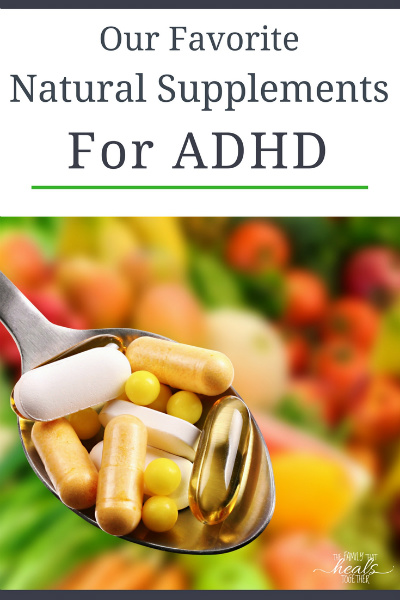If you’ve been experimenting with ways to relieve ADHD naturally, this list of natural alternatives to ADHD meds may help!

If your child is struggling with symptoms of ADHD, you’re probably desperate to get some relief for over-the-top behaviors.
When you have a child who can’t sit still, can’t keep his hands to himself, and can’t follow instructions, you begin to wonder if you’re doing something wrong.
It may even be a relief to get a diagnoses that confirms your child has ADHD (attention deficit hyperactivity disorder, often used interchangeably with ADD, or attention deficit disorder), even if you’re overwhelmed with what to do about it.
Common symptoms of ADHD include:
- hyperactivity
- inability to focus
- poor sleep habits
- impulsive behaviors
- short attention span
If you don’t want to resort to ADHD meds, have hope; there are natural solutions that work!
And while a child’s unusual and troublesome behaviors can be frustrating, you can always try natural solutions first, as conventional meds may have unintended consequences. Let’s first look at some of today’s popular prescription options.
What medications are used to treat ADHD?
There are a variety of medications used to treat ADHD in both children and adults. Let’s look at some popular ADHD meds:
- stimulants: these include drugs like Adderall and Ritalin and work by boosting levels of dopamine and norepinephrine in the brain, which helps nerves in the brain communicate better.
- non-stimulants: these include drugs like Strattera and Clonadine and work by boosting norepinephrine in the brain as well. They are sometimes used when stimulants don’t work or cause unwanted side effects.
- when typical ADHD meds don’t work, or if other symptoms are present combined with ADHD, sometimes meds like antidepressants are prescribed.
The problem with ADHD meds
ADHD/ADD medications carry the risk of cardiac toxicity, irregular heartbeat, and even sudden death due to adverse cardiac events. In addition, they have been found to impair proper growth, diminishing growth in both height and weight of children taking the medications, particularly those taking the drugs for longer than 18 months.
The National Institute of Mental Health cites the following side effects of antidepressants: suicidal thoughts or attempted suicide; acting aggressively, being angry, or violent; worsening anxiety or depression; irritability; insomnia; panic attacks; acting on dangerous impulses; and more.
Side effects for anti-anxiety meds also include depression and suicidal thoughts.
Stimulants (used for ADHD/ADD) may cause personality changes.
Mood stabilizer side effects may include agitation, mood swings, and abnormal thinking.
Other side effects may include tics, headaches, and nausea.
The problem with ADHD meds is that you don’t know how your child will respond, and often, a secondary or third medication may be prescribed to control symptoms that are caused by the original medication.
As if all of this is not concerning enough, consider that many acts of violence have been carried out by children, adolescents and young adults either on or withdrawing from psychiatric medications.
Is there a safe medicine for ADHD?
No prescription ADHD med comes without risk, but thankfully, there are natural options that work and don’t pose a threat to your child’s wellbeing.
Five Natural Alternatives to ADHD meds
1. Diet
First and foremost, your child must be on a real-foods diet. If your child is still eating foods containing neurotoxins, supplements are not going to work well.
Immediately remove food dyes, artificial sweeteners, and MSG from your child’s diet if you want to see symptoms improve. Following that, remove high fructose corn syrup and hydrogenated oils. (Read more about ingredients to remove from your child’s diet here.)
Consider a gluten and dairy-free diet or look into paleo, primal (which allows raw & cultured dairy), or the GAPS diet.
Once you’ve cleaned up your child’s diet and figured out foods he may be reacting to (like gluten or even corn), you may have great success with natural ADHD meds!
2. Magnesium L-Threonate
I’ve written about the specially-formulated magnesium for brain health that remains one of our favorite supplements to treat ADHD.
Magnesium is critical to brain health and cellular function, but all magnesium is not created equally. A newer form of magnesium, formulated especially for brain health, Magnesium L-Threonate was developed by researchers at MIT, including a Nobel Prize winner
According to this article by Dr. David Perlmutter, the research done by the developers “demonstrated actual restoration of function in aging neurons in laboratory animals. Further, it appears that this specific form of magnesium, Magtein, may in fact be the only form of magnesium that significantly increases the levels of magnesium within the brain.”
When regularly taking Magnesium L-Threonate, our son is calmer and more focused, and outbursts and impulsivity are minimized.
The kind we use is called MagMind, and we follow the supplementation directions on the bottle: two capsules in the morning and one capsule with dinner.
3. Neural Balance
Let’s first talk about GABA, or gamma aminobutyric acid, a naturally occurring neurotransmitter. Those who are GABA-deficient may experience symptoms of ADHD, as well as depression, anxiety, or insomnia.
The idea is that supplementing GABA will help to relieve these symptoms. However, GABA cannot pass the blood-brain barrier, so effects will not be long-lasting. The only GABA able to actually pass the blood-brain barrier is that created by your brain.
Enter Passionflower.
An herb called passionflower can help your brain create GABA itself. It has a notably calming effect on symptoms of ADHD, and can also be used it to ease anxiety and improve sleep. (Find the herbal sleep bomb recipe here.)
While using passionflower as a tincture for various calming purposes may help, it may not be strong enough for serious results.
Enter Neural Balance.
There is a newer supplement that contains high levels of passionflower extracts to target and improve brain health and promote calm.
Neural Balance can promote calm in a way that passionflower alone may not.
The proprietary combination of passionflower and other key ingredients is called Anandanol and it helps with:




